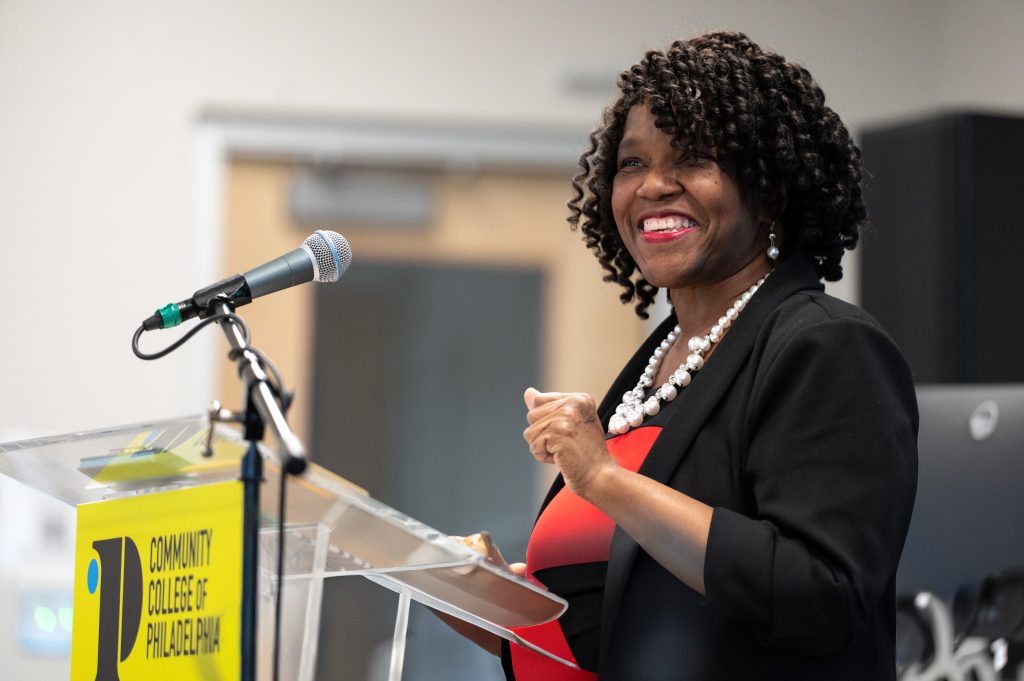By Adam Stone

As the first permanent executive director of the Citizens Police Oversight Commission (CPOC) is Philadelphia, Tonya McClary is focused on empowering communities through accountability and transparency in law enforcement.
This is not her first rodeo. Since graduating from UBalt Law in 1994, she previously served as the first police oversight director in Dallas. She inaugurated a similar role in New Orleans, starting the agency’s Use of Force Division, working with Commissioner Michael Harrison, who later became police commissioner in Baltimore.
This is high-profile, high-stakes work, especially in the era since the killing of George Floyd by police in 2020. “My agency is the one that’s potentially going to get the Philadelphia Police Department on the front page of the paper — and not in a good way,” McClary says. “So it’s very tense, and it’s very political.”
Driving change
Coming out of law school, McClary thought she would be a public defender. A city hiring freeze shut down that option, so she took a low-paid fellowship doing human rights work with Amnesty International and never looked back. With a long career in criminal justice and human rights work, “it was just natural to fall into this role of overseeing police departments,” she says.
When New Orleans offered her a job doing just that, she took two weeks to make up her mind. Could civilian oversight really sway police behaviors and keep communities safe? “But once I really just thought about it and saw the opportunity, it made total sense to me,” she says.
In Philadelphia, where she has worked since May 2024, she pursues that opportunity in multiple ways. “We actually are at the scene of the police shootings. We’re watching the investigation of officer-involved shootings in real time, and we make policy recommendations to the police department when they are involved in shootings,” she says.
People can file complaints of misconduct with her office. “When someone files a complaint and Internal Affairs investigates, we get to see the investigation before it’s finalized and make additional recommendations,” she says. Her office does community outreach too, making sure people understand their rights, and advocating on behalf of residents.
McClary pursues all this with the goal of driving fundamental change in how policing is conducted. “I hope maybe one day I’ll work myself out of a job,” she says.
‘Very political’
Police agency oversight is hard work, and relatively short tenures are common. McClary spent about three years in NOLA and four years in Dallas. “These jobs are very political,” she says.
Most cities ramp up oversight after a traumatic event — think George Floyd or Freddie Gray. Often they do so under federal orders. There’s tension there.
“In most cities, most of the leadership — the mayor, the city manager, the city council — are very much behind their police department. People feel like they have to choose: Either I’m going to support the oversight agency or I’m going to support the police,” McClary says. “If it comes down between you and the police department, they’re going to go with the police department.”
How to stand up for what’s right in that environment? “I just don’t compromise. And in the back of my head, I always know that one day the phone may ring and someone’s going to say: Tonya, this is not working for us,” she says. “I come into jobs with that awareness.”
There are legal complexities as well. In Philly, for example, the police union recently blocked her office’s ability to conduct independent investigations, as part of contract negotiations.
“Even though that’s a big part of what I’m supposed to do, according to the legislation, we’re not even in the room” for those discussions, she says.
Pushing the boundaries
Those who know McClary says she’s especially well-suited to thrive in this challenging environment.
“Tonya’s unafraid, and she’s willing to push beyond boundaries, to challenge the status quo, particularly for what she feels in her heart, and her spirit is right,” says friend and law school classmate Stephanie Franklin, J.D. ’94, president & CEO at The Franklin Law Group, in Owings Mills, and CEO at Powerhouse Master Coaching Inc.
“She is tough. She is courageous. She’s a strong relationship builder, a strong communicator, and she’s strategic. She’s all of those things, as well as being very personable and caring and compassionate,” Franklin says.
On the best days, McClary’s work makes a big difference.
In Dallas, for example, the George Floyd killing sparked more than 100 days of protest. “There was an incident where some protestors had gone up on a bridge and ended up being corralled in by the police. They were getting ready to tear gas several hundred people,” she says.
McClary got on the phone with the chief of police, the Dallas city manager and the district attorney’s office, arguing it wouldn’t be a good idea to tear gas hundreds of people trapped on a bridge. “I used my authority and influence to have this whole thing avoided,” she says.
Her UBalt Law experiences primed her for success. An internship at the public defender’s office and a civil advocacy clinic gave a real-world taste of social justice work. And key mentors have also played a role, including the artist, singer, and nonprofit leader Niyonu Spann.
“She has taught me about being really, truly who you are in the work that you are called to do,” McClary says. “She has encouraged me over the years to really find who is the authentic Tonya.”
Adam Stone is a writer based in Annapolis.
